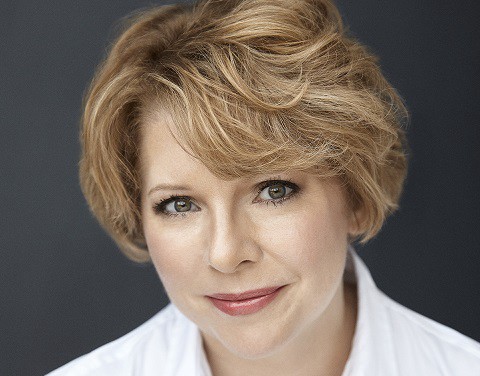Guest Post by Melanie Benjamin
Some of the highest grossing and critically-acclaimed films released last year were by and about women. 2017 was somewhat of a banner year for women in Hollywood, thanks largely to titles such as “Wonder Woman,” “Star Wars: The Last Jedi,” “Lady Bird,” and “Mudbound.”
But there was a time when this would not have been huge news. There was a time when women — two women in particular — were making the most popular movies coming out of Hollywood. And that is the story I tell in my new historical novel, “The Girls in the Picture.”
This novel is about two pioneers of early Hollywood, Mary Pickford and Frances Marion. I’m a movie buff, and I’ve always been drawn to the silent era because it was just so exciting and raw. In reading about those early days, I was intrigued by the friendship between Pickford and Marion. Two women, helping each other in an industry that’s not always known for that — it was something I really wanted to explore. And in exploring the friendship and its impact on both their careers, not to mention personal lives (Pickford for instance, introduced Marion to the great love of her life; Marion advised Pickford during the agony of her affair with Douglas Fairbanks), I learned how these two collaborators shaped the industry as much as, or more than, the men they worked with.
Soon after their meeting in 1914, Marion, beginning with her screenplay for “The Poor Little Rich Girl,” not only cemented Pickford’s enduring image as America’s Sweetheart (this was the first film in which Pickford portrayed the little girl that she became most known for), but began a streak of writing some of the most successful movies of the silent and early sound era — “Pollyanna,” “Rebecca of Sunnybrook Farm,” “Stella Dallas,” “Son of the Sheik,” “The Wind,” “The Champ,” and “Dinner at Eight.”
Pickford, aside from being the first world-renowned movie star, was also one of the first actors to have her own production company, the first to command a million dollars per film, and finally, the first female head of a major motion picture studio, when she founded — along with Douglas Fairbanks, Charlie Chaplin, and D.W. Griffith — United Artists.
But in telling their story, I can’t help but ask the question, “What happened?” What happened to all those women like Marion and Pickford who helped invent Hollywood, who were there on the ground floor, who commanded the same salaries as men? Influential screenwriters like Anita Loos, Kate Corbalay, and June Mathis, and directors such as Dorothy Arzner, Lois Weber, and Mabel Normand?
Money. That’s what happened.
Back in 1914, nobody really thought the “flickers” were going to last. Stage actors thumbed their noses at their cinematic counterparts. Movie “theaters” were still empty stores with a big sheet and folding chairs. But the dancing images captured the public’s imagination; directors like Griffith — and Alice Guy Blachè — elevated those flickers to an art form.
Suddenly, Hollywood was big business. The East Coast banking industry began to invest in studios and pictures. And as always seems to happen when men invest money in an industry, they started pushing women aside and marginalizing them.
It’s okay for women to be trusted and encouraged when an industry is in its infancy; when everyone is making up the language as they go along (Pickford, for instance, invented the baby spot) and there’s not much to lose. But when an industry becomes enormously lucrative, suddenly men don’t want to trust women to do much of anything. And that’s exactly what happened in Hollywood; once the collection of small, upstart studios consolidated, resulting in the “Big Five” (MGM, Warner Brothers, Paramount, RKO, Century Fox) and the “Little Three” (Columbia, Universal, and United Artists), they were headed by men. Pickford was the lone female, over at United Artists.
Something else happened, too. Hollywood became a major cultural influence.
And maybe this is another reason the female point of view was pushed aside: The dawning realization that movies were influencing the way America and the world thought, loved, laughed. Perhaps this forced the men in the picture to subtly push the women out of it.
From about 1946 on, films increasingly focused on the male point-of-view. And for that, no one was going to hire female directors. Soon, female writers like Marion were retiring, no longer able to exert control over their own screenplays, seeing them instead being picked apart in committees comprised almost entirely of male producers.
And that’s where we’ve been until now — a full 100 years after Pickford and Marion reigned supreme over Hollywood.
Is 2018 the year we regain more of the ground we’ve lost this past century?
There are positive signs. Organizations are doing necessary work. Television — streaming and otherwise — has entered a golden age and the stories being told are women’s stories, such as “Big Little Lies,” “The Crown,” and “The Handmaid’s Tale.”
But the fact remains that over a 100 years since Pickford and Marion helped invent Hollywood, women in every sector are still fighting to have their voices heard and to have their stories given as much respect as the stories of men.
I just know that I would love to be able to go out there and talk about this book without having to first explain what the hell happened to all the girls since, both in the picture and outside it.
“The Girls in the Picture” will be released January 16.
Melanie Benjamin is the New York Times bestselling author of “The Aviator’s Wife,” “The Autobiography of Mrs. Tom Thumb,” and “Alice I Have Been.” She is currently working on her next historical novel.







